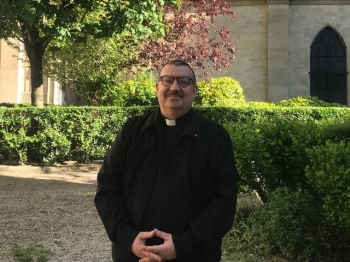Jean-Marc Fournier, the ecclesiastical Knight of the Order who became the hero of Notre Dame

Father Jean-Marc Fournier entered the burning Notre-Dame Cathedral, together with a team of firefighters, to save the Crown of Thorns and the Holy Sacrament, sparking worldwide admiration. In this interview released one month after the Notre Dame fire, the chaplain to the firefighters of Paris and Knight of the Order of the Holy Sepulchre evokes the exceptional meaning that the Relics of the Passion have for him and speaks of the role of the priest within the Order.
As the flames engulfed the cathedral of Notre-Dame, you went back in to recover the Holy Relics alongside the firefighters of Paris. What does the Crown of Thorns mean to you, as a member of the Order?
We sometimes mock Saint Thomas who wanted to touch Christ’s wounds left by the nails, but in certain circumstances, we need tangible signs of faith.
All the relics related to the Passion of the Lord Jesus Christ have a fundamental importance for Christians like us. We are well known to be the only ones to venerate an empty Sepulchre ... Fortunately empty, because if Jesus had not risen from the dead – as St. Paul reminds us – our faith would be in vain.
This intimate resonance supports the Christian’s faith. After that, we also enter into the Great History, which goes beyond the hunt for relics, covering the entire medieval period. The King Saint Louis redeemed the precious relics and had the most beautiful Parisian monuments erected in their honour.
This initial momentum is still to be found in our Order in our Order. The Chivalric Orders represent a prophetic vision of the popes. I would say a sort of ante litteram Schengen Agreement, since the need for free movement of goods and people was part of the papal vision. When the Seljuks began to conquer the Holy Land, obstructing these movements of people and goods, they began to preach the first Crusade ... and then all the others, in order to restore that freedom. This gave rise to the aforementioned Orders, in particular the Order of the Canons of the Holy Sepulchre.
I have been to the Holy Land once, I would like to return, God willing: I can say that such a journey transforms the way in which one lives one’s faith. The fact of having visited the Holy Land allows us – in our meditations and readings of the Bible – to “imagine”, to incarnate, since Salvation passes through the Incarnation of God, which is decisive.
You have been inundated with media requests after the Notre Dame fire. How do you manage this sudden fame?
Fortunately, I live in quite a protected and removed context, which is part of the military life and its statutes protect us. We are bound to confidentiality; therefore, we can speak very little. The communication staff manage everything, so everything is “contextualized”. After the fire, we received requests from all over the globe.
Our maxim with the firefighters is “Save or perish”, which clearly highlights our commitment. We also have another motto: “Selflessness, competence and discretion”. Sometimes we also add the word humility. We always keep it in mind: when we are hesitant about how we should behave, the fact of being rooted in these three words helps us to face difficult times like this more serenely.
You pointed out in a recent article that your membership within the Order of the Holy Sepulchre represents a service for souls and not a race for medals. What is the role of the priest in the Order in your opinion?
The manner in which the French Lieutenancy is organized means that in every Delegation it is important to support the Latin Patriarchate, but also to work for one’s own personal sanctification. In the order of grace, we must first be grace filled – like the Holy Virgin – and then have an effective benefit on our neighbours around us. The Knight or Dame – to prove himself or herself even more efficient in helping others – must work on his or her own sanctification.
In France, we have monthly meetings during which a short time is always devoted to the small questions to be discussed and sharing. Afterwards, work is carried out on the theme of the year, with the documents prepared by the Grand Prior. The priest has the task of accompanying this reading by remaining in the recto dictio, in a Catholic vision of things, inviting to prayer and works of piety ... The presence of the priest encourages a virtuous circle that draws everyone upwards. Modestly, this is what we try to do, especially in the Delegation of Saint-Rémy, Reims and Chalons, where I am Prior.
How does this mission resonate with your mission as a military chaplain?
The two missions are concomitant: in fact, I entered the Order because I was a military chaplain. A friend of mine was chancellor and member of the Order in the Delegation of Chalons, therefore of Reims. We got to know each other on military mission to Africa and we became friends. He proposed that I join the Order; so, after finding out more, I started attending their meetings.
Members of the Order have the same desire to rediscover free commitment and self-denial, to contribute to the happiness of others. After two years, I decided to become a full member at the invitation of the head of the Delegation at the time.
Interview by Solène Tadié
(Summer 2019)



